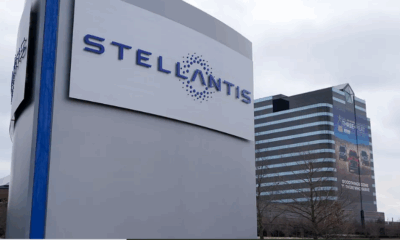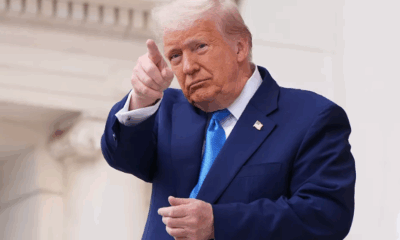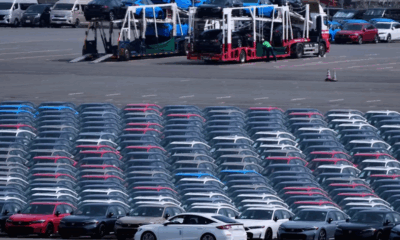Business
Volvo Cars to Cut 3,000 Jobs Amid Industry Headwinds and Shift in EV Strategy
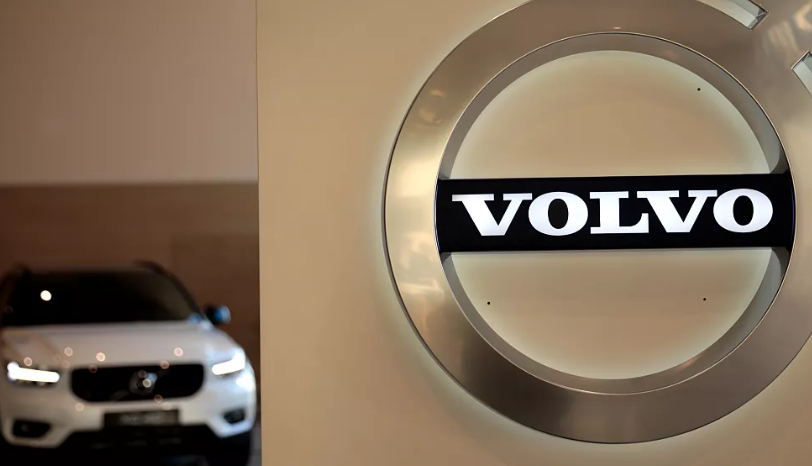
Volvo Cars has announced plans to cut approximately 3,000 jobs globally, with the majority of layoffs impacting office-based roles in Sweden, as part of a sweeping cost-cutting programme aimed at strengthening the company’s long-term resilience.
The Sweden-headquartered automaker said on Monday that about 1,200 of the job reductions will directly affect employees based in Sweden. In addition, around 1,000 consultant roles—also primarily in Sweden—are slated for elimination. The remaining job cuts will take place in other international markets.
“The actions announced today have been difficult decisions, but they are important steps as we build a stronger and even more resilient Volvo Cars,” said Håkan Samuelsson, Volvo Cars President and CEO. “The automotive industry is in the middle of a challenging period. To address this, we must improve our cash flow generation and structurally lower our costs.”
The company, which is owned by China’s Geely, employs around 42,600 people globally. The job cuts reflect mounting pressures on the global auto industry, including rising raw material costs, slowing demand in Europe, and ongoing trade tensions that have created economic uncertainty.
Volvo, with its main offices and research facilities in Gothenburg, operates manufacturing plants in Belgium, China, and the United States. While the company had once committed to selling only electric vehicles (EVs) by 2030, it has since scaled back its ambitions. Last year, Volvo cited reduced government incentives, inadequate charging infrastructure, and increased tariffs on Chinese-made EVs as reasons for tempering its electrification timeline.
Volvo’s announcement comes as other major carmakers also tighten their belts. Earlier this month, Japanese auto giant Nissan revealed plans to slash 11,000 jobs and close seven factories worldwide, bringing its total layoffs over the past year to 20,000—around 15% of its global workforce. Nissan’s struggles include aggressive discounting in the U.S. and falling sales in China, compounded by the recent collapse of a proposed merger with Mitsubishi and Honda.
Meanwhile, Chinese EV brands such as BYD, Leapmotor, and Changan are intensifying competition by lowering prices on dozens of models, adding further pressure to established global automakers.
As the EV transition accelerates amid volatile market conditions, Volvo’s decision underscores the deep structural changes sweeping through the global automotive industry.
Business
U.S. Economy Contracts for First Time in Three Years Amid Tariff Turmoil
Business
Stellantis Appoints Antonio Filosa as CEO Amid Profit Slump and Strategic Challenges
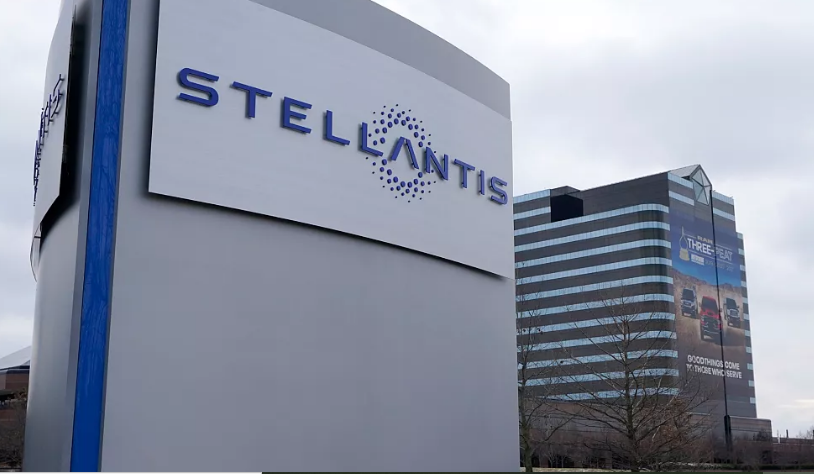
Stellantis has named Antonio Filosa, its Chief Operating Officer for North America, as the company’s new Chief Executive Officer, following the unexpected resignation of former CEO Carlos Tavares in December. Filosa, 51, will formally assume the role on June 23, pending approval at an upcoming shareholder meeting.
The announcement, made on Monday, comes at a turbulent time for the world’s fourth-largest carmaker, which has been grappling with slowing sales in key markets and internal disagreements over the pace of electrification.
Stellantis, the multinational automotive group behind 14 brands including Peugeot, Fiat, Chrysler, Citroën, and Jeep, issued a profit warning last September due to slumping demand in the United States and Europe. The warning preceded the abrupt exit of Tavares, who reportedly clashed with the board over his aggressive push for a full transition to battery electric vehicles (BEVs) in Europe by 2030. The board had advocated for a more gradual approach.
Filosa’s appointment signals a strategic reset for the group, which is under pressure from weak North American performance, rising global competition, and trade policy uncertainties, particularly from the United States. Former President Donald Trump’s tariff stance on foreign automakers continues to cast a shadow over multinational manufacturers like Stellantis.
In its official statement, the company praised Filosa for his “proven track record of hands-on success during his more than 25 years in the automotive industry,” as well as his “unrivalled knowledge of the company and recognised leadership qualities.” The Naples-born executive has held various leadership roles across Stellantis’ global operations and was promoted to head of North America shortly after Tavares’ departure.
During his tenure in North America, Filosa has worked to reduce bloated inventories and restore dealer confidence following months of sluggish sales. As CEO, he will now oversee a vast portfolio of brands and be tasked with balancing profitability, innovation, and sustainability across diverse markets.
Filosa’s leadership will be closely watched as Stellantis navigates regulatory shifts, intensifying competition in electric vehicles, and a volatile geopolitical landscape. The shareholder meeting to confirm his appointment is expected to be announced in the coming days.
Business
European Firms Cut Costs and Investments in China Amid Economic Slowdown, EU Chamber Says

European businesses are scaling back investments and tightening budgets in China as economic headwinds and intensifying competition weigh heavily on profitability, according to a new report released Wednesday by the European Union Chamber of Commerce in China.
The Business Confidence Survey 2025, based on responses from around 500 European companies operating in China, highlights a significant decline in business sentiment. The report points to shrinking margins, overcapacity in key sectors, and ongoing economic uncertainty as major factors driving the pullback.
“The picture has deteriorated across many key metrics,” the Chamber said in the survey’s introduction, underscoring a challenging environment for foreign businesses navigating a sluggish Chinese economy.
China is grappling with a prolonged real estate crisis that has dampened consumer confidence and spending. Compounding the issue is a surge in industrial output—particularly in sectors like electric vehicles—fueled by government subsidies. The resulting overcapacity has triggered price wars, making it increasingly difficult for foreign firms to maintain profitability.
“Downward pressure on profits has increased over the past year, and the fall in business confidence has yet to bottom out,” said Jens Eskelund, president of the EU Chamber, during a media briefing. “It is just very difficult for everyone right now in an environment of declining margins.”
Eskelund noted that while Chinese authorities have made efforts to stimulate domestic demand, such measures are insufficient unless matched by controls on supply growth. “There’s a clear perception that the benefits of the bilateral trade and investment relationship are not being distributed in an equitable manner,” he added.
The report also touches on growing geopolitical tensions and trade friction. European governments, particularly the EU, have become increasingly wary of China’s industrial strategy. Last year, the European Commission imposed tariffs on Chinese electric vehicles, citing unfair subsidies that distorted competition.
Meanwhile, Chinese firms—unable to absorb their surplus production domestically—are aggressively expanding into overseas markets, raising fears in Europe that cheap imports could threaten local industries and jobs.
The Chamber’s findings suggest that unless structural economic imbalances are addressed and market access improves, European firms may continue to retreat from new investments in China. As Beijing faces increasing global scrutiny over its trade practices, restoring investor confidence remains a daunting challenge.
-

 Business1 year ago
Business1 year agoSaudi Arabia’s Model for Sustainable Aviation Practices
-

 Business1 year ago
Business1 year agoRecent Developments in Small Business Taxes
-

 Politics1 year ago
Politics1 year agoWho was Ebrahim Raisi and his status in Iranian Politics?
-

 Business11 months ago
Business11 months agoCarrectly: Revolutionizing Car Care in Chicago
-

 Business11 months ago
Business11 months agoSaudi Arabia: Foreign Direct Investment Rises by 5.6% in Q1
-

 Technology1 year ago
Technology1 year agoComparing Apple Vision Pro and Meta Quest 3
-

 Politics1 year ago
Politics1 year agoIndonesia and Malaysia Call for Israel’s Compliance with ICJ Ruling on Gaza Offensive
-

 Sports10 months ago
Sports10 months agoKeely Hodgkinson Wins Britain’s First Athletics Gold at Paris Olympics in 800m



